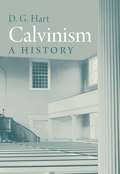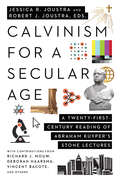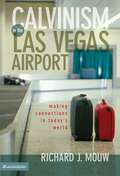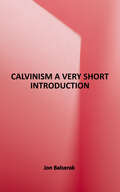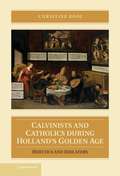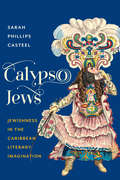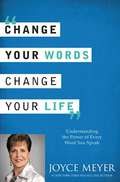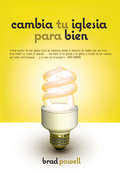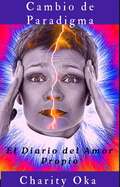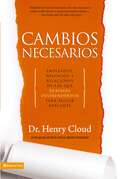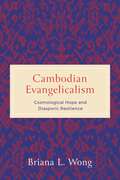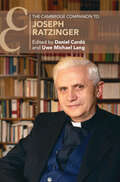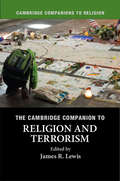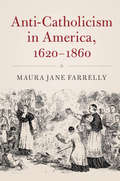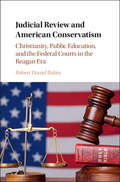- Table View
- List View
Calvinism
by Prof. Darryl HartThis briskly told history of Reformed Protestantism takes these churches through their entire 500-year history--from sixteenth-century Zurich and Geneva to modern locations as far flung as Seoul and São Paulo. D. G. Hart explores specifically the social and political developments that enabled Calvinism to establish a global presence. Hart's approach features significant episodes in the institutional history of Calvinism that are responsible for its contemporary profile. He traces the political and religious circumstances that first created space for Reformed churches in Europe and later contributed to Calvinism's expansion around the world. He discusses the effects of the American and French Revolutions on ecclesiastical establishments as well as nineteenth- and twentieth-century communions, particularly in Scotland, the Netherlands, the United States, and Germany, that directly challenged church dependence on the state. Raising important questions about secularization, religious freedom, privatization of faith, and the place of religion in public life, this book will appeal not only to readers with interests in the history of religion but also in the role of religion in political and social life today.
Calvinism for a Secular Age: A Twenty-First-Century Reading of Abraham Kuyper's Stone Lectures
by Robert J. Joustra Jessica R. Joustra, Robert J. Joustra Jessica R. JoustraAbraham Kuyper, the Dutch Neo-Calvinist theologian, pastor, and politician, was well-known for having declared that there is "not a square inch" of human existence over which Jesus Christ is not its sovereign Lord. This principle is perhaps best reflected in Kuyper's writings on Calvinism originally delivered as the Stone Lectures in 1898 at Princeton Theological Seminary. These lectures reflecting on the role of the Christian faith in a variety of social spheres—including religion, politics, science, and art—have become a touchstone for contemporary Reformed theology. How might the lectures continue to inform the church's calling in a secular age? In this volume, Jessica Joustra and Robert Joustra bring together theologians, historians, scientists, and others to revisit Kuyper's original lectures and to critically consider both his ongoing importance and his complex legacy for today.
Calvinism in the Las Vegas Airport: Making Connections in Today's World
by Richard J. MouwWhat do the Canons of Dordt mean to people in the Las Vegas airport—and does anyone there even care? In the movie Hardcore, a pious Calvinist elder tries unsuccessfully to explain the TULIP theology of his Dutch Reformed faith to a prostitute in the Las Vegas airport. This incongruous conversation demonstrates how Calvinism is often perceived today: irrelevant, harsh, even disrespectful. Beginning with this movie scene, Calvinism in the Las Vegas Airport addresses the weaknesses of Calvinism and points to its strengths. How does Calvinism shed light on today? Instead of reciting the Canons of Dordt, what’s a more compassionate way to relate to nonbelievers? What might it look like to live out the doctrines of TULIP with gentleness and respect? This conversational book provides answers and shatters some stereotypes. Calvinism in the Las Vegas Airport encourages you to live every aspect of life—business, family, education, politics, activities, and more—before the face of a generous, sovereign God. Calvinists and non-Calvinists alike will find this an enjoyable read. You will discover that Reformed theology can speak relevantly and compellingly today, both to you and to people in the Las Vegas airport. Does Calvinism Have Anything to Do with the 21st Century? What do you think about Calvinism? Do you view it positively or negatively? Or has its day passed? Let’s face it, many non-Calvinists hold a less-than-positive view, sometimes due to caricatures. This friendly, conversational book helps clear up some misconceptions and distorted views. If you’re not a Calvinist, here is an engaging inside look. And if you are a Calvinist, Richard Mouw shows how to live gently and respectfully with others—Christians and non-Christians—who hold different perspectives. Calvinism in the Las Vegas Airport focuses not on what Calvinists believe but on how they live. From a movie scene to the author’s personal experiences in Las Vegas, you are invited to travel with Mouw and see the Reformed faith in a new light. Yes, it still does travel well!
Calvinism: A Very Short Introduction (Very Short Introductions)
by Jon BalserakJohn Calvin was born only a few years before the Christian church in Europe was plunged into the chaos of the Protestant Reformation. To Calvin, the only thing that mattered was correcting God's church, which he thought had wandered away from the truth. Throughout his adult life, Calvin manifested a singular passion with God. He desired intensely to subjugate the world to what he saw as God's truth, and his ideas started the movement now known as Calvinism. <p><p>From Calvin's time, the movement has grown and spread throughout Europe and into North and South America, Africa, and Asia. Today 'New Calvinism' is a major branch of Protestantism. In this Very Short Introduction, Jon Balserak explores Calvin's life and considers the major ideas and issues associated with the Calvinist system of thought. He looks at how Calvinist ideas and practices spread and took root, helping shape societies today. Much of contemporary thought - especially western thought - on everything from civil government to money, suicide, and divorce has been influenced by Calvinism. Balserak also combats common misconceptions about Calvinism, and explores the relationship between Calvinism and the modern world. <p><p>ABOUT THE SERIES: The Very Short Introductions series from Oxford University Press contains hundreds of titles in almost every subject area. These pocket-sized books are the perfect way to get ahead in a new subject quickly. Our expert authors combine facts, analysis, perspective, new ideas, and enthusiasm to make interesting and challenging topics highly readable.
Calvinists and Catholics during Holland's Golden Age
by Christine KooiThis book examines the social, political, and religious relationships between Calvinists and Catholics during Holland's Golden Age. Although Holland, the largest province of the Dutch Republic, was officially Calvinist, its population was one of the most religiously heterogeneous in early modern Europe. The Catholic Church was officially disestablished in the 1570s, yet by the 1620s Catholicism underwent a revival, flourishing in a semi-clandestine private sphere. The book focuses on how Reformed Protestants dealt with this revived Catholicism, arguing that confessional coexistence between Calvinists and Catholics operated within a number of contiguous and overlapping social, political, and cultural spaces. The result was a paradox: a society that was at once Calvinist and pluralist. Christine Kooi maps the daily interactions between people of different faiths and examines how religious boundaries were negotiated during an era of tumultuous religious change.
Calypso Jews: Jewishness in the Caribbean Literary Imagination (Literature Now)
by Sarah Phillips CasteelIn original and insightful ways, Caribbean writers have turned to Jewish experiences of exodus and reinvention, from the Sephardim expelled from Iberia in the 1490s to the "Calypso Jews" who fled Europe for Trinidad in the 1930s. Examining these historical migrations through the lens of postwar Caribbean fiction and poetry, Sarah Phillips Casteel presents the first major study of representations of Jewishness in Caribbean literature. Bridging the gap between postcolonial and Jewish studies, Calypso Jews enriches cross-cultural investigations of Caribbean creolization.Caribbean writers invoke both the 1492 expulsion and the Holocaust as part of their literary archaeology of slavery and its legacies. Despite the unequal and sometimes fraught relations between Blacks and Jews in the Caribbean before and after emancipation, Black-Jewish literary encounters reflect sympathy and identification more than antagonism and competition. Providing an alternative to U.S.-based critical narratives of Black-Jewish relations, Casteel reads Derek Walcott, Maryse Condé, Michelle Cliff, Jamaica Kincaid, Caryl Phillips, David Dabydeen, and Paul Gilroy, among others, to reveal a distinctive interdiasporic literature.
Cambia Tus Palabras, Cambia Tu Vida: Entender el Poder de Cada Palabra que Dices
by Joyce Meyer"Las palabras son un gran problema. Ellos son contenedores de poder, y tenemos que decidir qué tipo de poder queremos que nuestras palabras para llevar", dice Joyce Meyer en CAMBIA TUS PALABRAS, CAMBIA TU VIDA. "Creo que nuestras palabras pueden aumentar o disminuir nuestro nivel de felicidad. Pueden afectar a las respuestas a nuestras oraciones y tienen un efecto positivo o negativo sobre nuestro futuro .... Se podría decir que nuestras palabras son una pantalla de cine que revela lo que hemos estado pensando y las actitudes que tenemos. " Basándose en las premisas de Pensamientos de alimentación y viven más allá de sus emociones, se examina el tremendo poder de las palabras - que son los vehículos que transportan nuestros pensamientos y emociones - y proporciona una serie de directrices para asegurarse de que nuestra conversación es constructiva, la curación sana, y se utiliza para buenos resultados. Los temas incluyen: El impacto de las palabras Cómo domesticar su lengua Cómo ser feliz Cuándo hablar y cuándo no hablar con Hablando Fe y no el temor La corrosión de Quejas ¿Realmente tiene que dar su opinión? La importancia de mantener tu palabra El poder de hablar la Palabra de Dios ¿Cómo tener una boca inteligente En un 'Diccionario de la Palabra de Dios "en la parte final del libro, Joyce ofrece docenas de versículos de las Escrituras, ordenados por temas, que recomienda la lectura y decir en voz alta como una forma de usar y afirmando las palabras de sanación.
Cambia tu iglesia para bien
by Brad PowellCada semana más y más personas se alejan de la iglesia, no porque no crean sino porque la iglesia se ha vuelto irrelevante para sus vidas. No Dios, la iglesia.En 1990, Brad Powell se unió a la Iglesia NorthRidge como pastor principal, una congregación sin entusiasmo luchando por ser relevante para Cristo. Ahora considerada una de "las iglesias de más rápido crecimiento" en los estados del medio oeste y "una de las 50 iglesias más influyentes". El pastor Powell restauró la iglesia en una comunidad próspera infundiéndola de amor, de alcance, relevancia cultural y una relación renovada con Dios. Cambia tu iglesia para bien suministra a los pastores y otros líderes de la iglesia, mediante experiencias personales directas y anécdotas, los recursos esenciales para que la alegría y la vida sean restauradas en una iglesia que está muriéndose.Si eres un líder buscando dirección para el cambio, o un miembro orando para un milagro, este ejemplo viviente puede servirte de punto de partida para tu iglesia.
Cambio de Paradigma: El Diario del Amor Propio
by Charity OkaEste breve libro lo lleva a un cambio de paradigma en varios aspectos de su vida. Podrás experimentar el cambio de paradigma que tu vida necesita para alcanzar las metas trazadas y cumplir el destino. ¿Sabes que has estado engañado toda tu vida? Este breve e impactante libro revelará el lavado de cerebro de la sociedad que debes descifrar. Explica cómo su brújula emocional ha sido secuestrada y controlada por figuras de autoridad externas. También describe los pasos que puede comenzar a seguir para recuperar su poder y mejorar su vida.
Cambios Necesarios: Empleados, negocios y relaciones de los que debemos desprendernos para seguir adelante
by Henry CloudAunque los cambios son una parte natural de los negocios y la vida, con frecuencia los enfrentamos con duda, tristeza, resignación y pesar; sin embargo, el doctor Henry Cloud tiene una perspectiva muy diferente acerca de estos. Por eso, en el presente libro señala que nuestra vida personal y profesional solo podrá mejorar cuando logremos cambios necesarios y estratégicos para alcanzar algo superior y abrir el espacio para el crecimiento profesional y personal. Sobre la base de su vasta experiencia como consultor ejecutivo y psicólogo, el autor nos ofrece en este texto intuitivo una serie de consejos y estudios de casos que nos resultarán muy útiles en nuestra vida diaria. Además, nos enseña que para alcanzar la felicidad y el éxito es fundamental saber cuándo y cómo ponerle punto final a algo o alguien que no está funcionando bien en el negocio o en una relación personal, para de esta manera seguir avanzando. Con la lectura de este material tendremos las herramientas necesarias para despedirnos de algo y continuar adelante.
Cambodian Evangelicalism: Cosmological Hope and Diasporic Resilience (World Christianity)
by Briana L. WongThe Cambodian Civil War and genocide of the late 1960s and ’70s left the country and its diaspora with long-lasting trauma that continues to reverberate through the community. In this book, Briana L. Wong explores the compelling stories of Cambodian evangelicals, their process of conversion, and how their testimonials to the Christian faith helped them to make sense of and find purpose in their trauma.Based on ethnographic fieldwork with Cambodian communities in the metropolitan areas of Philadelphia, Los Angeles, Paris, and Phnom Penh, Wong examines questions of religious identity and the search for meaning within the context of transnational Cambodian evangelicalism. While the community has grown in recent decades, Christians nevertheless make up a small minority of the predominantly Buddhist diaspora. Wong explores what it is about Christianity that makes these converts willing to risk their social standing, familial bonds,and, in certain cases, physical safety in order to identify with the faith. Contributing to ongoing dialogues on conversion, reverse mission, and multiple religious belonging, this book will appeal to students and scholars of world Christianity, missiology, and the history of Christianity, as well as Southeast Asian studies, secular sociologies, and anthropologists operating within the field of religious studies.
Cambridge Classical Studies: Revisiting Delphi
by Julia KindtRevisiting Delphi speaks to all admirers of Delphi and its famous prophecies, be they experts on ancient Greek religion, students of the ancient world, or just lovers of a good story. It invites readers to revisit the famous Oracle of Apollo at Delphi, along with Herodotus, Euripides, Socrates, Pausanias and Athenaeus, offering the first comparative and extended enquiry into the way these and other authors force us to move the link between religion and narrative centre stage. Their accounts of Delphi and its prophecies reflect a world in which the gods frequently remain baffling and elusive despite every human effort to make sense of the signs they give.
Cambridge Classical Studies: Theologies of Ancient Greek Religion
by Robin Osborne Julia Kindt Esther EidinowStudied for many years by scholars with Christianising assumptions, Greek religion has often been said to be quite unlike Christianity: a matter of particular actions (orthopraxy), rather than particular beliefs (orthodoxies). This volume dares to think that, both in and through religious practices and in and through religious thought and literature, the ancient Greeks engaged in a sustained conversation about the nature of the gods and how to represent and worship them. It excavates the attitudes towards the gods implicit in cult practice and analyses the beliefs about the gods embedded in such diverse texts and contexts as comedy, tragedy, rhetoric, philosophy, ancient Greek blood sacrifice, myth and other forms of storytelling. The result is a richer picture of the supernatural in ancient Greece, and a whole series of fresh questions about how views of and relations to the gods changed over time.
Cambridge Classical Studies: Votive Body Parts in Greek and Roman Religion
by Jessica HughesThis book examines a type of object that was widespread and very popular in classical antiquity - votive offerings in the shape of parts of the human body. It collects examples from four principal areas and time periods: Classical Greece, pre-Roman Italy, Roman Gaul and Roman Asia Minor. It uses a compare-and-contrast methodology to highlight differences between these sets of votives, exploring the implications for our understandings of how beliefs about the body changed across classical antiquity. The book also looks at how far these ancient beliefs overlap with, or differ from, modern ideas about the body and its physical and conceptual boundaries. Central themes of the book include illness and healing, bodily fragmentation, human-animal hybridity, transmission and reception of traditions, and the mechanics of personal transformation in religious rituals.
Cambridge Companions to Religion: The Cambridge Companion to Christian Political Theology
by Craig HoveyInterest in political theology has surged in recent years, and this accessible volume provides a focused overview of the field. Many are asking serious questions about religious faith in secular societies, the origin and function of democratic polities, worldwide economic challenges, the shift of Christianity's center of gravity to the global south, and anxieties related to bold and even violent assertions of theologically determined political ideas. In fourteen original essays, authors examine Christian political theology in order to clarify the contemporary discourse and some of its most important themes and issues. These include up-to-date, critical engagements with historical figures like Augustine, Thomas Aquinas, and Immanuel Kant; discussions of how the Bible functions theopolitically; and introductions to key movements such as liberation theology, Catholic social teaching, and radical orthodoxy. An invaluable resource for students and scholars in theology, the Companion will also be beneficial to those in history, philosophy, and politics.
Cambridge Companions to Religion: The Cambridge Companion to Joseph Ratzinger (Cambridge Companions To Religion Ser.)
by Uwe Michael Lang Daniel CardóCambridge Companions to Religion: The Cambridge Companion to Reformed Theology
by Nimmo, Paul T. and Fergusson, David A. S. Paul T. Nimmo Fergusson, David A. S.This Companion offers an introduction to Reformed theology, one of the most historically important, ecumenically active, and currently generative traditions of doctrinal enquiry, by way of reflecting upon its origins, its development, and its significance. The first part, Theological Topics, indicates the distinct array of doctrinal concerns which gives coherence over time to the identity of this tradition in all its diversity. The second part, Theological Figures, explores the life and work of a small number of theologians who have not only worked within this tradition, but have constructively shaped and inspired it in vital ways. The final part, Theological Contexts, considers the ways in which the resultant Reformed sensibilities in theology have had a marked impact both upon theological and ecclesiastical landscapes in different places and upon the wider societal landscapes of history. The result is a fascinating and compelling guide to this dynamic and vibrant theological tradition.
Cambridge Companions to Religion: The Cambridge Companion to Religion and Terrorism (Cambridge Companions to Religion)
by Lewis James R.There is currently much discussion regarding the causes of terrorist acts, as well as the connection between terrorism and religion. Terrorism is attributed either to religious 'fanaticism' or, alternately, to political and economic factors, with religion more or less dismissed as a secondary factor. The Cambridge Companion to Religion and Terrorism examines this complex relationship between religion and terrorism phenomenon through a collection of essays freshly written for this volume. Bringing varying approaches, from the theoretical to the empirical, to the topic, the Companion includes an array of subjects, such as radicalization, suicide bombing, and rational choice, as well as specific case studies. The result is a richly textured collection that prompts readers to critically consider the cluster of phenomena that we have come to refer to as 'terrorism,' and terrorism's relationship with the similarly problematic set of phenomena that we call 'religion. '
Cambridge Companions to Religion: The Cambridge Companion to the Hebrew Bible/Old Testament
by Marvin A. Sweeney Chapman, Stephen B. and Sweeney, Marvin A. Stephen B. ChapmanThis Companion offers a concise and engaging introduction to the Hebrew Bible or Old Testament. Providing an up-to-date 'snapshot' of scholarship, it includes essays, specially commissioned for this volume, by twenty-three leading scholars. The volume examines a range of topics, including the historical and religious contexts for the contents of the biblical canon, and critical approaches and methods, as well as newer topics such as the Hebrew Bible in Islam, Western art and literature, and contemporary politics. This Companion is an excellent resource for students at university and graduate level, as well as for laypeople and scholars in other fields who would like to gain an understanding of the current state of the academic discussion. The book does not presume prior knowledge, nor does it engage in highly technical discussions, but it does go into greater detail than a typical introductory textbook.
Cambridge Companions to Religion: The Cambridge Companion to the Summa Theologiae
by Denys Turner McCosker, Philip and Turner, Denys Philip MccoskerArguably the most influential work of systematic theology in the history of Christianity, Thomas Aquinas' Summa Theologiae has shaped all subsequent theology since it was written in the late thirteenth century. This Companion features essays from both specialists in Aquinas' thought and from constructive contemporary theologians to demonstrate how to read the text effectively and how to relate it to past and current theological questions. The authors thoroughly examine individual topics addressed in the Summa, such as God, the Trinity, eternity, providence, virtue, grace, and the sacraments, making the text accessible to students of all levels. They further discuss the contextual, methodological, and structural issues surrounding the Summa, as well as its interaction with a variety of religious traditions. This volume will not only allow readers to develop a comprehensive multi-perspectival understanding of Aquinas' main mature theological work, but also promote dialogue about the vital role of the Summa in theology today.
Cambridge Critical Guides: Aquinas’s Disputed Questions on Evil
by M. V. DoughertyThomas Aquinas's Disputed Questions on Evil is a careful and detailed analysis of the general topic of evil, including discussions on evil as privation, human free choice, the cause of moral evil, moral failure, and the so-called seven deadly sins. This collection of ten, specially commissioned new essays, the first book-length English-language study of Disputed Questions on Evil, examines the most interesting and philosophically relevant aspects of Aquinas's work, highlighting what is distinctive about it and situating it in relation not only to Aquinas's other works but also to contemporary philosophical debates in metaphysics, ethics, and philosophy of action. The essays also explore the history of the work's interpretation. The volume will be of interest to researchers in a broad range of philosophical disciplines including medieval philosophy and history of philosophy, as well as to theologians.
Cambridge Essential Histories: Anti-Catholicism in America, 1620–1860 (Cambridge Essential Histories)
by Farrelly Maura JaneUsing fears of Catholicism as a mechanism through which to explore the contours of Anglo-American understandings of freedom, Anti-Catholicism in America, 1620-1860 reveals the ironic role that anti-Catholicism played in defining and sustaining some of the core values of American identity, values that continue to animate our religious and political discussions today. Farrelly explains how that bias helped to shape colonial and antebellum cultural understandings of God, the individual, salvation, society, government, law, national identity, and freedom. In so doing, Anti-Catholicism in America, 1620-1860 provides contemporary observers with a framework for understanding what is at stake in the debate over the place of Muslims and other non-Christian groups in American society.
Cambridge Historical Studies in American Law and Society: Judicial Review and American Conservatism
by Rubin Robert DanielThe Christian Right of the 1980s forged its political identity largely in response to what it perceived as liberal 'judicial activism'. Robert Daniel Rubin tells this story as it played out in Mobile, Alabama. There, a community conflict pitted a group of conservative evangelicals, a sympathetic federal judge, and a handful of conservative intellectuals against a religious agnostic opposed to prayer in schools, and a school system accused of promoting a religion called 'secular humanism'. The twists in the Mobile conflict speak to the changes and continuities that marked the relationship of 1980s' religious conservatism to democracy, the courts, and the Constitution. By alternately focusing its gaze on the local conflict and related events in Washington, DC, this book weaves a captivating narrative. Historians, political scientists, and constitutional lawyers will find, in Rubin's study, a challenging new perspective on the history of the Christian Right in the United States.
Cambridge Introductions to Music
by David HileyWhat is Gregorian chant, and where does it come from? What purpose does it serve, and how did it take on the form and features which make it instantly recognizable? Designed to guide students through this key topic, this book answers these questions and many more. David Hiley describes the church services in which chant is performed, takes the reader through the church year, explains what Latin texts were used, and, taking Worcester Cathedral as an example, describes the buildings in which it was sung. The history of chant is traced from its beginnings in the early centuries of Christianity, through the Middle Ages, the revisions in the sixteenth and seventeenth centuries, and the restoration in the nineteenth and twentieth. Using numerous music examples, the book shows how chants are made and how they were notated. An indispensable guide for all those interested in the fascinating world of Gregorian chant.
Cambridge Latin American Studies: Theater of a Thousand Wonders
by Taylor William B.The great many shrines of New Spain have become long-lived sites of shared devotion and contestation across social groups. They have provided a lasting sense of enchantment, of divine immanence in the present, and a hunger for epiphanies in daily life. This is a story of consolidation and growth during the seventeenth and eighteenth centuries, rather than one of rise and decline in the face of early stages of modernization. Based on research in a wide array of manuscript and printed primary sources, and informed by recent scholarship in art history, religious studies, anthropology, and history, this is the first comprehensive study of shrines and miraculous images in any part of early modern Latin America.
